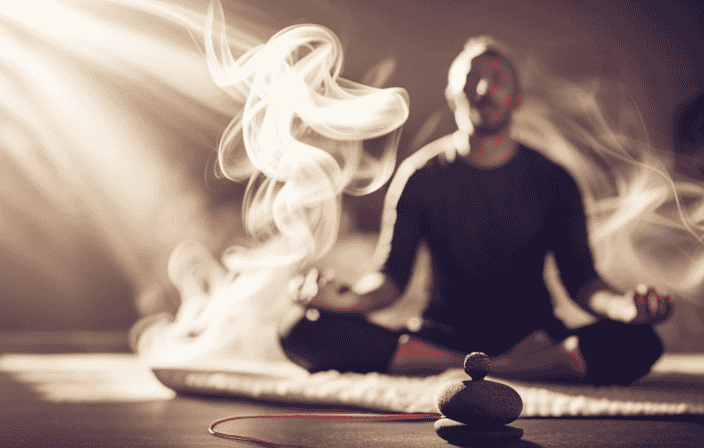College offers a chance for personal growth and exploration, but it can also bring about feelings of pressure and worry. Take Sarah, for example, a college student who often feels overwhelmed by her schoolwork and the pressure to succeed. Like many others, Sarah experiences symptoms of anxiety such as racing thoughts and difficulty concentrating.
However, there are strategies that can help individuals like Sarah cope with anxiety in college and thrive academically and personally. In this article, we will explore various coping strategies that can lead to success in managing anxiety during the college years.
Key Takeaways
- Practicing self-care, such as maintaining a healthy diet, exercising regularly, getting enough sleep, and engaging in mood-improving activities, is crucial in coping with anxiety in college.
- Identifying triggers, such as lifestyle changes, workload thoughts, caffeine/alcohol consumption, and poor sleep and diet, is important for managing anxiety.
- Seeking help from friends, family members, therapists, or peer counselors can provide support and reassurance that you are not alone in dealing with anxiety.
- Setting realistic goals, avoiding self-isolation, incorporating meditation into daily routine, prioritizing sleep, managing school stress effectively, and coping with uncertainty are all essential strategies for success in coping with anxiety in college.
What is it?
Anxiety in college refers to the experience of overwhelming anxiety among college students, with symptoms such as sweatiness, shortness of breath, rapid heartbeat, and restlessness.
It is important to note that anxiety can be managed through therapy, medication, and lifestyle changes. Coping mechanisms play a crucial role in managing anxiety in college.
Students can develop coping strategies such as practicing self-care, identifying triggers, seeking help, setting realistic goals, avoiding self-isolation, incorporating meditation into their daily routine, prioritizing sleep, managing school stress, and coping with uncertainty. These coping mechanisms help students navigate the challenges and pressures of college life.
Additionally, having a strong support system is essential for managing anxiety. Students can lean on friends, family members, therapists, and peer counselors for support, guidance, and understanding. Building a network of support can provide a sense of reassurance and help students cope effectively with their anxiety.
Causes and Factors
Excessive use of electronic devices has been identified as a contributing factor to the high prevalence of anxiety among college students. The causes of anxiety in college are multifaceted and can stem from various factors.
These include:
- Lifestyle changes
- Workload thoughts
- Caffeine/alcohol consumption
- Irregular sleep
- Poor diet
Additionally, homesickness, loneliness, relationship issues, poor adjustment, uncertainty about the future, and substance use can also trigger anxiety.
The impact of anxiety on academic performance is significant, as it can lead to difficulties in concentration, memory, and problem-solving abilities. College students experiencing anxiety may struggle to meet deadlines, perform well on exams, or actively engage in class discussions.
It is crucial to address these causes and factors of anxiety in order to promote better mental well-being and academic success.
Common Symptoms
A storm of physical sensations, like sweatiness, shortness of breath, rapid heartbeat, and restlessness, often accompany the overwhelming burden of anxiety experienced by college students. These symptoms can be debilitating and interfere with daily activities and academic performance. Understanding the common symptoms of anxiety is crucial in order to effectively cope with it.
Here are three common symptoms of anxiety that college students often experience:
-
Sweating: Excessive sweating is a common symptom of anxiety. It can be embarrassing and uncomfortable, leading to further distress and self-consciousness.
-
Shortness of breath: Anxiety can cause a feeling of tightness in the chest and difficulty breathing. This can be particularly distressing for individuals experiencing anxiety attacks.
-
Rapid heartbeat: Anxiety often leads to an increased heart rate, which can feel like a racing or pounding sensation in the chest. This can further intensify feelings of anxiety and panic.
In order to address these symptoms and manage anxiety effectively, college students can employ various self-care techniques, such as maintaining a healthy diet, exercising regularly, getting enough sleep, and engaging in activities that improve mood. Seeking professional help from therapists or counselors can also provide additional support and guidance.
Diagnosis and Testing
Diagnosis and testing for anxiety in college often involve a comprehensive evaluation conducted by mental health professionals. The diagnosis process typically begins with a thorough assessment of the individual’s symptoms and medical history.
Mental health professionals may use various types of tests to aid in the diagnosis of anxiety disorders. These tests may include self-report questionnaires, structured interviews, and psychological assessments.
Self-report questionnaires, such as the Beck Anxiety Inventory or the Generalized Anxiety Disorder 7-item scale, provide individuals with a standardized set of questions to assess the severity of their anxiety symptoms.
Structured interviews, such as the Anxiety Disorders Interview Schedule, aim to gather detailed information about the individual’s symptoms and their impact on daily functioning.
Psychological assessments, such as the Minnesota Multiphasic Personality Inventory, may be used to assess underlying psychological factors that contribute to anxiety.
The results of these tests, combined with the clinician’s expertise, guide the diagnosis and help determine an appropriate treatment plan for managing anxiety in college students.
Self-Care Practices
Self-care practices play a crucial role in managing and alleviating symptoms of anxiety among college students. Studies have shown that engaging in regular exercise and maintaining a healthy diet can reduce anxiety levels by up to 48%.
Creating a self-care routine is essential for college students to prioritize their mental well-being. Maintaining a healthy diet and exercising regularly not only improves physical health but also has a positive impact on mental health.
It is important for students to make time for activities that improve mood, such as watching a funny movie or engaging in hobbies they enjoy. Laughter reduces stress and improves overall health.
By incorporating self-care practices into their daily routine, college students can effectively manage anxiety and promote their overall well-being. The importance of self-care in college cannot be overstated, as it provides students with the tools to cope with the challenges and pressures they may face in their academic and personal lives.
Identifying Triggers
In the previous section, we discussed the importance of self-care practices in coping with anxiety in college. Now, let us delve into the next subtopic, which is identifying triggers that contribute to anxiety in college students. Understanding the specific triggers of anxiety is crucial in effectively managing and coping with it. Lifestyle changes, workload thoughts, caffeine/alcohol consumption, irregular sleep, and poor diet are common triggers. Additionally, homesickness, loneliness, relationship issues, poor adjustment, uncertainty about the future, and substance use can also contribute to anxiety. Mindfulness techniques can help in identifying these triggers by bringing awareness to the present moment and observing one’s thoughts, emotions, and physical sensations. By recognizing these triggers, individuals can develop coping strategies and implement necessary changes to reduce their anxiety levels.
To further illustrate this point, let us consider the following table:
| Triggers | Coping Strategies |
|---|---|
| Workload thoughts | Prioritize tasks and break them into smaller, manageable steps |
| Irregular sleep | Establish a regular sleep schedule and practice relaxation techniques before bed |
| Homesickness | Engage in activities that promote social connections and seek support from friends or family members |
By incorporating mindfulness techniques and utilizing appropriate coping strategies, college students can effectively manage their anxiety and create a more positive and fulfilling college experience.
Seeking Help
Seeking assistance from mental health professionals, such as therapists or peer counselors, can provide valuable support and guidance for college students experiencing anxiety. These professionals are trained to help individuals manage and cope with their anxiety symptoms effectively. Here are some benefits of therapy and support from peers:
-
Benefits of therapy:
- Therapists can provide a safe and non-judgmental space for students to express their concerns and emotions.
- They can help identify the root causes of anxiety and develop coping strategies.
- Therapy offers evidence-based techniques, such as cognitive-behavioral therapy, to challenge negative thoughts and behaviors.
-
Support from peers:
- Peer counselors, who are fellow students trained in counseling, can offer a relatable perspective and understanding.
- Sharing experiences with peers can help reduce feelings of isolation and provide a sense of belonging.
- Peer support groups provide a supportive community where students can learn from each other’s coping strategies.
By seeking help from professionals and peers, college students can receive the necessary support to manage their anxiety effectively and thrive in their academic journey.
Setting Realistic Goals
Setting realistic goals is crucial for college students as it allows them to effectively manage their workload and avoid feeling overwhelmed; research shows that students who set realistic goals are more likely to experience academic success and have better mental well-being. Overcoming obstacles and managing time effectively are key aspects of setting realistic goals. By breaking tasks into smaller, manageable steps and prioritizing them, students can better allocate their time and resources. Additionally, seeking help from professors or tutors when needed can provide valuable support in achieving these goals. To engage the audience further, a table can be used to visually represent different time management strategies, such as creating a schedule, using productivity apps, and setting deadlines. These strategies can help students stay organized and achieve their goals while reducing anxiety and promoting overall well-being.
| Time Management Strategies |
|---|
| Create a schedule |
| Use productivity apps |
| Set deadlines |
Avoiding Self-Isolation
Avoiding self-isolation is essential for college students in order to maintain a healthy social life and reduce the risk of experiencing higher levels of anxiety and depression. Socializing benefits individuals by providing a sense of belonging and connection with others, which can alleviate feelings of loneliness and promote overall well-being.
Loneliness is often linked to higher levels of anxiety and depression, making it important for college students to actively engage in social activities. Spending time in social spaces, such as libraries or cafeterias, allows students to interact with their peers and distract themselves from anxious thoughts.
Prioritizing socializing and avoiding seclusion can help students cope with anxiety and improve their mental health. By actively seeking social interaction, college students can create a support network that contributes to their overall success and well-being.
Benefits of Meditation
One effective approach for managing anxiety in college is incorporating meditation into daily routines. Meditation techniques, such as mindfulness meditation, have been found to be beneficial for college students with anxiety. This practice helps reduce stress, improve focus, and enhance overall mental well-being. By incorporating meditation into their daily routine, college students can develop a sense of calm and inner peace, allowing them to better cope with the pressures and challenges of college life.
To incorporate meditation into their daily routines, college students can try different techniques such as mindfulness meditation or guided meditation. These techniques involve focusing on the present moment, observing thoughts and emotions without judgment, and cultivating a sense of awareness and acceptance. By practicing meditation regularly, college students can develop a greater sense of self-awareness and learn to manage their anxiety more effectively.
To further illustrate the benefits of meditation, the following table highlights some of the positive effects of incorporating mindfulness into daily routines:
| Benefits of Incorporating Mindfulness |
|---|
| Reduces stress |
| Improves focus |
| Enhances mental well-being |
| Promotes self-awareness |
In conclusion, incorporating meditation, specifically mindfulness techniques, into daily routines can be an effective strategy for managing anxiety in college. By practicing meditation regularly, college students can experience a reduction in stress, improved focus, and an overall enhanced sense of well-being.
Importance of Sleep
Transitioning from the benefits of meditation, another crucial aspect of managing anxiety in college is the importance of sleep. Establishing a consistent sleep routine and practicing good sleep hygiene are essential for maintaining overall mental well-being. Sleep plays a significant role in managing anxiety as a lack of sleep can contribute to heightened levels of anxiety.
To establish a regular sleep schedule, it is important to prioritize going to bed and waking up at the same time every day, even on weekends. Creating a sleep-friendly environment by keeping the bedroom cool, dark, and quiet can also promote better sleep. Additionally, practicing relaxation techniques before bed, such as deep breathing or progressive muscle relaxation, can help calm the mind and prepare for a restful night’s sleep.
By prioritizing sleep and implementing these sleep hygiene tips, college students can better cope with anxiety and improve their overall mental health.
Frequently Asked Questions
How does anxiety in college affect academic performance?
Anxiety in college can negatively impact academic performance. The stress and symptoms associated with anxiety can make it difficult to concentrate, retain information, and perform well on exams and assignments, affecting overall grades and success in college.
Are there any specific support groups or resources available for college students with anxiety?
Support groups and resources are available for college students with anxiety. These include campus counseling centers, therapy services, peer support programs, and online communities. Connecting with others who understand can provide valuable support and guidance.
Can anxiety in college lead to other mental health issues?
Anxiety in college can lead to other mental health issues, such as anxiety-induced depression. The long-term effects of anxiety can have a significant impact on a person’s overall well-being and should be addressed with appropriate support and treatment.
Are there any alternative therapies or treatments for managing anxiety in college?
Alternative therapies and natural remedies can be effective in managing anxiety in college. Techniques such as acupuncture, herbal supplements, aromatherapy, and yoga have shown promise in reducing anxiety symptoms and promoting overall well-being.
How can college students communicate their anxiety to professors or academic advisors for additional support?
College students can communicate their anxiety to professors or academic advisors by scheduling a private meeting, expressing their concerns calmly and honestly, providing specific examples of how anxiety impacts their academic performance, and discussing possible accommodations or support services. Seeking support is crucial for managing anxiety in college.









